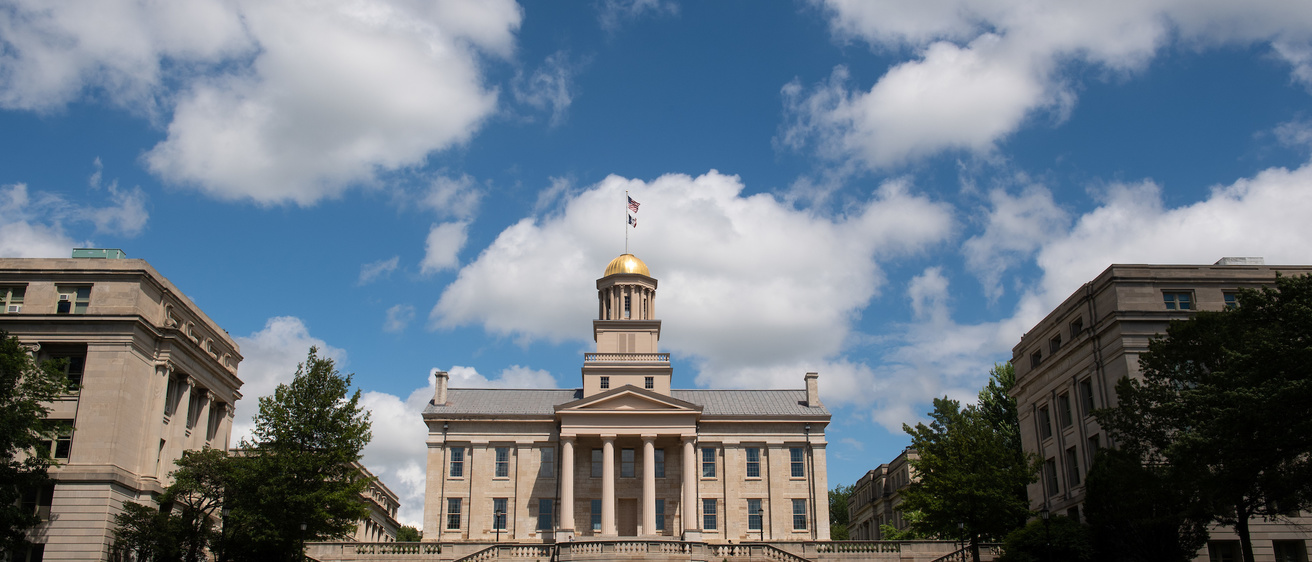University of Iowa shared governance bodies elect new leadership each spring semester. Together, Faculty Senate, Staff Council, Undergraduate Student Government (USG), and Graduate and Professional Student Government (GPSG) shape policies and inform decisions that affect Iowa’s students, faculty, and staff. They represent their constituents to the UI administration; the Board of Regents, State of Iowa; the public; and state and federal government.
Read about the skills and experience these leaders bring to their positions and what they aim to accomplish this year.
Faculty Senate
Joseph Yockey, president of Faculty Senate, is professor and Michael and Brenda Sandler Faculty Fellow in Corporate Law in the College of Law.
Teresa Marshall, vice president of Faculty Senate, is the Michael W. Finkelstein Centennial Professor of Teaching and director of the Student Research Program in the College of Dentistry and Dental Clinics.
Learn more about Faculty Senate.
What experiences inform your role as a shared governance leader?
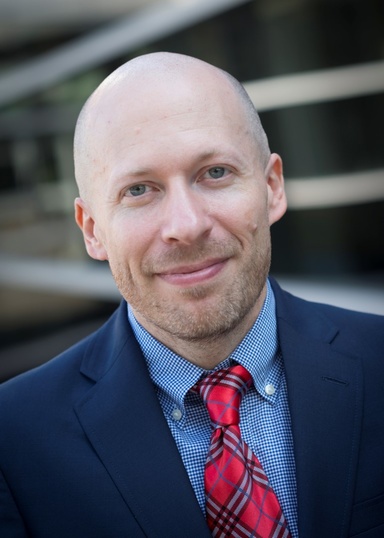
Yockey: I’m a professor in the College of Law. After serving as both Faculty Senate secretary and vice president, I became president this past May. I’ve served in numerous leadership roles as part of collegiate and university committees, and last year I was a fellow in the Big Ten Academic Alliance’s Academic Leadership Program. Before teaching, I practiced business law at a private firm in Chicago.

Marshall: I am a professor in the College of Dentistry where I also direct the Student Research Program. I’ve served on Faculty Senate, Faculty Council, and as Faculty Senate secretary last year. Within the College of Dentistry, I’ve worked with faculty across departments to build interdisciplinary programs. I will be participating in the Big Ten Academic Alliance’s Academic Leadership Program this year, which is designed to develop leadership and managerial skills.
What are important issues facing your constituents, and how do you plan to address them?
The most immediate issue is reopening campus amidst the pandemic. Advocating for the safety and well-being of faculty is our paramount objective, and that means we will continue to monitor and engage with campus administrators to ensure they are adequately responding to the risks presented by COVID-19. We will do whatever we can to help faculty structure their teaching and research activities in accord with their personal health needs. At the same time, we will continue to emphasize the need for meaningful faculty participation in budget planning. We want to ensure shared governance principles are respected if further cost-saving measures are proposed.
What can we expect from Faculty Senate in the coming months?
In addition to working on the issues mentioned above, we will start two large projects. The first will focus on finding ways to boost faculty morale and improve faculty recruitment and retention. The second project will seek to implement a policy to provide faculty with greater voice in reviewing the performance of deans and associate deans within their own college and department. Neither of these strategic initiatives is meant to take the place of the larger need to recover from the pandemic, and we do not see them as conflicting with that effort. To come out of this crisis in a position to make positive, lasting change, we need to be thinking about faculty interests in both the short term and the long term.
Staff Council
Heather Mineart, president of Staff Council, is assistant to the DEO in the Department of Physics and Astronomy.
Kevin Zihlman, vice president of Staff Council, is assistant athletics director of compliance in the Department of Intercollegiate Athletics.
Learn more about Staff Council.
What experiences inform your role as a shared governance leader?
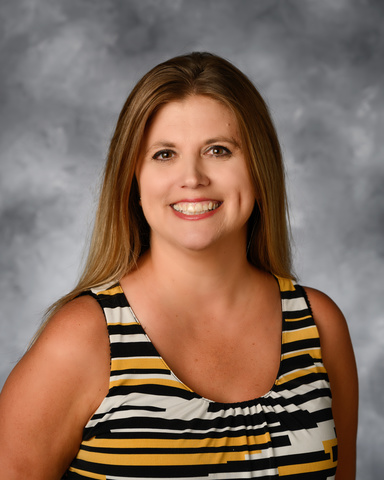
Mineart: As a member of the university community for more than 19 years, serving in capacities as a merit staff member, a professional/scientific staff member, and on various committees across campus, I have the experiences needed to inform my position as president of Staff Council. These last three months have left me awestruck by the resilience of our campus and surrounding communities. I continue to give my gratitude to all frontline employees as they continue to perform essential services across campus and all those working remotely during COVID-19.
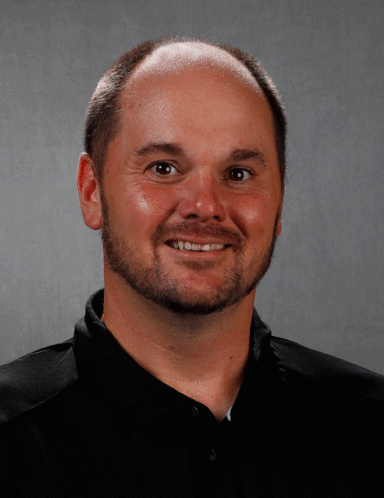
Zihlman: My career in academia has taken me to different institutions of higher education and led me to spend the last 10 years as a full-time staff member at the UI. I’ve been involved in varied university-wide committees that have included students, faculty, and staff, and I’ve taken the time to listen to the viewpoints of varied constituents. I have been a full-time undergraduate student who has worked multiple jobs to pay for school. I’ve been a graduate student with a teaching assistantship. I’ve been an adjunct instructor for undergraduate- and graduate-level classes. And most recently, I’ve been a full-time staff member in higher education. I’ve worn multiple hats in higher education and can relate to many who are studying, teaching, and working at Iowa.
What are important issues facing your constituents, and how do you plan to address them?
Mineart: We are facing uncertain times filled with distress from the pandemic, racial injustice, budget cut concerns, sending our kids back to the classroom, and the recent derecho; we have been faced with uncertainty coming at us from all directions.
With all these uncertainties, we have been forced into a “new normal” that remains undefined. Staff Council continues to play a critical role in promoting collaboration, diverse perspectives, transparency, and staff recognition by partnering with other shared governance groups and UI administration on important issues and major decisions affecting staff.
Zihlman: Staff Council must provide a voice for UI staff in discussions of the impact of COVID-19 on the UI budget and the national discussion on social justice. Like many across the country, staff are experiencing a “new normal” when it comes to work arrangements and possible pay freezes or reductions. In my role on Staff Council, I will engage with UI leadership to make sure the staff impact is always considered when decisions are being made on the financial stability of the UI, as well new policies and protocols in the wake of COVID-19. Staff Council needs to continue to remain a strong voice for all staff through these unprecedented times.
What can we expect from UISC in the coming months?
Mineart: You can expect Staff Council to continue its efforts to represent staff across campus and remain focused and engaged with other campus leaders to ensure a safe return to campus and determine what that looks like for staff across the university.
In June, UI Staff Council reaffirmed its commitment to advancing diversity, equity, and inclusion across campus, and we have been working to make good on this commitment. At our August meeting, our committees finalized their goals for the year and shared both influential and actionable items.
Zihlman: Much of Staff Council’s work is done in its internal committees. Staff Council committees set their goals for the coming year in August, and I’m excited to see how those goals can effect positive change at the UI. Staff Council was successful in advocating for the required Supervisor Training@Iowa project and will continue to speak up to make sure our campus policies and protocols contribute to an overall positive work experience for staff.
Undergraduate Student Government (USG)
Connor Wooff, USG president, is a fourth-year undergraduate from Cedar Rapids, Iowa, majoring in political science and minoring in Spanish.
Mara Smith, USG vice president, is a fourth-year undergraduate from West Des Moines, Iowa, majoring in therapeutic recreation and minoring in human relations with a disabilities studies certificate.
What experiences inform your role as a shared governance leader?
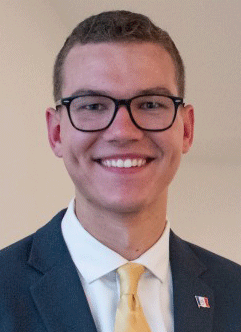
Wooff: Over my nearly four years on this campus, I’ve been privileged to participate in a number of roles and opportunities that have given me the tools necessary to lead our undergraduate student body. They span from student support through residence education and orientation services to student advocacy as USG director of governmental relations. I’ve spent my time at Iowa listening to students and learning how to change their lives for the better. As student body president, I hope to continue this as we work to uplift the voices of students every single day.
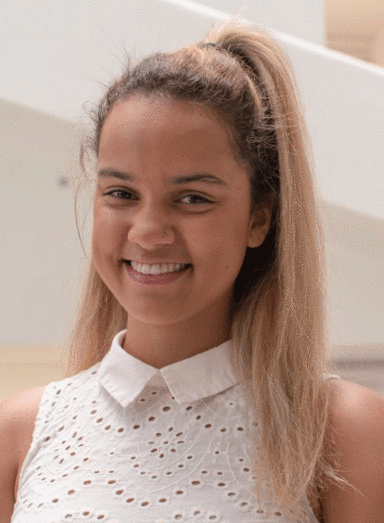
Smith: This will be my fourth year on campus, and every year I have been able to make more and more meaningful connections with other student leaders and students who aren’t as involved. I like to use these connections to inform decisions. As USG leaders, it is our job to listen to students and use their voices to inform our decisions. I look on social media for what people are saying about Iowa and our campus, and to see what things people want changed. I also listen in my classes, talk to my friends, and engage in conversations wherever I can so I am advocating for what most students want and not just what I want.
What are important issues facing your constituents and how do you plan to address them?
Wooff: When Mara and I ran in March 2020, we could have never imagined all that was approaching for our campus. We are living in the most challenging times in a generation. A global pandemic is once again surging, our economy is in spiral, and communities across our state have been devastated by an unprecedented natural disaster. The health and well-being of all our students is our uppermost priority as we move forward. We will continue to listen and learn from our constituents, raise their concerns, push for answers, and work to develop solutions amid COVID-19. Meanwhile, we must recognize the countless other issues that continue to face our campus—pandemic or not.
Smith: This year is different than most years in that most years the administration gets to look at campus and decide what they want to focus their energy on. After this summer of being in office, I have noticed that will not be the case this year. The two things I will focus my attention on this year are COVID-19 and the issues facing Black and other minority students on our campus. The global pandemic needs to be at the forefront of the work we are doing because that impacts every single student on our campus. We have a COVID-19 task force that meets weekly to discuss these issues and make action plans. Additionally, this summer the Black Lives Matter movement brought to light a lot of issues on our campus that need to be addressed. I will be working closely with our director of justice and equity, Ruth Kahssai, to make sure no one on our campus feels like they are in danger because of the color of their skin and they can enjoy their time at Iowa.
What can we expect from Undergraduate Student Government in the coming months?
Wooff: As we begin the semester, there is no doubt our community will continue to face unprecedented and urgent challenges. USG is committed to supporting students every step of the way and plans to actively engage students, staff, faculty, and administration throughout this process. For the coming months, our most pressing priorities will be health and safety, racial justice, civic engagement, and financial stability.
Smith: We will be doing our best to regularly communicate to students how to be safe during COVID-19, how to get involved with USG and other orgs, civic engagement opportunities, and other resources about online classes and navigating college during this time.
Graduate and Professional Student Government (GPSG)
Mackensie Graham, president of GPSG, is a third-year student in the College of Law who lives in Coralville, Iowa.
Ellen Kiser, vice president of GPSG, is a fourth-year graduate student from Juda, Wisconsin, pursuing a PhD in the Department of Microbiology and Immunology.
What experiences inform your roles as shared governance leaders?
Both of us have previous GPSG experience that has helped inform our perceptions of where GPSG has been and where the governing body can and is able to grow.

Kiser: I’ve served in the Graduate Student Senate (GSS) for two years, and in the 2019–20 academic year I served as a GPSG delegate on behalf of GSS. As a PhD candidate in the Department of Microbiology and Immunology, I seek to bring my research and experience as a member of Dr. Mary Wilson’s laboratory, as well as skills in data interpretation, to help GPSG approach complex, important issues.
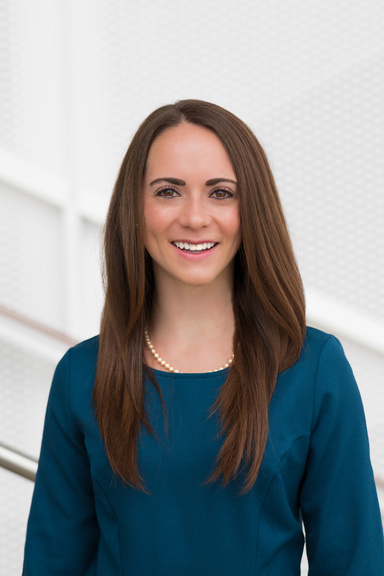
Graham: I previously served as a delegate for the Iowa Student Bar Association, the student government at the UI College of Law, and last year served as cabinet director and worked closely with GPSG President Dexter Golinghorst and GPSG Vice President Thomas Pak. Along with my legal education, coursework related to my master’s in public policy, and bachelor’s in public relations, has come in useful. Also, my experience last semester with Professor Fisher Page’s Community Empowerment Law Project at the College of Law Legal Clinic greatly influenced my approach to problem-solving and advocacy.
What are the important issues facing your constituents and how do you plan to address them?
Top of mind for us and our fellow graduate and professional students is navigating the numerous public health concerns related to COVID-19 on both a personal and campus community level. Graduate teaching and research assistants are facing unique threats to safety related to in-person teaching and work. Campaign to Organize Graduate Students (COGS) has been a steadfast leader on this front as well. COVID-19 has also further exposed inequities related to technology accessibility, exacerbated mental health concerns, and imposed particular challenges on students who are parents/guardians of school-age children.
Another important subject at the top of our agenda is working with our campus partners to address how law enforcement perpetuates pervasive, systemic racism and what needs to change at so many different levels on our campus.
More often than not, the issues facing graduate and professional students are not isolated to just our group, which is why we feel incredibly lucky to have sharp, devoted colleagues in Undergraduate Student Government, Staff Council, and Faculty Senate to collaborate with.
Unfortunately, these big issues precede us and are likely to persist beyond our tenure. However, just because these challenges are difficult will not prevent us from pressing forward and working with the necessary stakeholders to cultivate change.
What can we expect from GPSG in the coming months?
We are immensely proud of the dedicated officers, chairs, and delegates who are a part of GPSG this year. We will continue to build a solid coalition of the seven member governments that comprise GPSG and steadfastly support our colleagues and classmates during this unprecedented time.
A mantra that helped guide us so far is, “No matter what anyone says, just show up and do the work.” Ultimately, that’s what graduate and professional students can and should expect from us and GPSG as a whole—to show up and fight the good fight, have the difficult conversations, and seek to leave our corners of the campus better than we found them.
Specifically, a few of the many things we look forward to include: the upcoming joint session with our colleagues in USG; and continuing to press for increased support from the Iowa Legislature considering the value higher education adds to the state.
